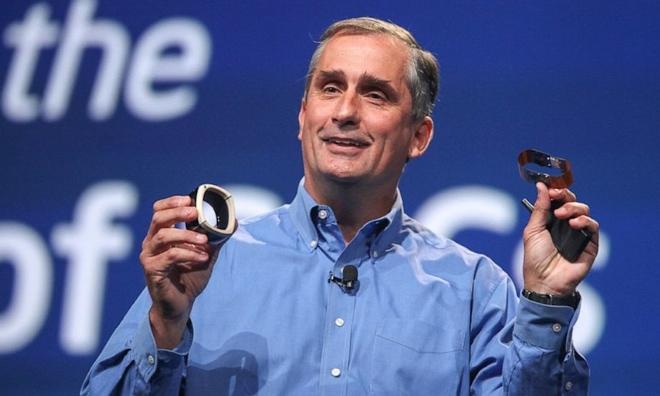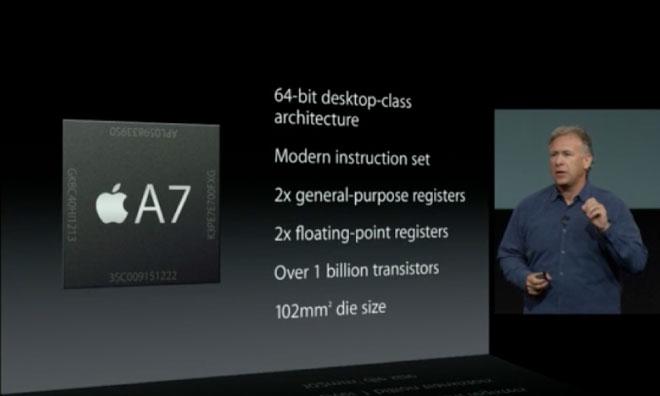Intel Chief Executive Brian Krzanich, who has served as head of the chipmaker for less than one year, was asked on Wednesday about his company's relationship with Apple, and responded that the two parties continue to "grow closer" as time progresses.
Intel CEO Brian Krzanich shows concept devices running new Quark CPUs. Image via ABC News.
Krzanich took part in an Ask Me Anything question-and-answer session on Reddit, in which he was asked about a range of subjects related to his position at Intel, where he has been CEO since last May. One user asked Krzanich how close Intel's relationship is with Apple, and if it has changed since the company moved its Mac lineup to Intel processors nearly a decade ago.
"We've always had a very close relationship with Apple and it continues to grow closer," Krzanich shared. "Sure (it's) grown close over the years, especially since... they started to use our technology in their systems."
"We've always had a very close relationship with Apple and it continues to grow closer." - Intel CEO Brian Krzanich
The CEO went on to explain that Intel is always trying to forge a closer relationship with its partners. He shared a bit of advice from former Intel Chief Executive Paul Otellini, who told him that the company wins when its end customers win.
Intel is the largest semiconductor maker in the world, providing the central processors found in most Windows PCs as well as all of Apple's Macs. But while Intel is the exclusive chipmaker for the Mac, the company has had a sometimes contentious relationship with Apple.
That's largely stemmed from the fact that Apple uses ARM-based processors, and not Intel silicon, for its wildly popular iPhone and iPad lineups. Otellini revealed last year as he exited Intel that his company had the opportunity to be a part of Apple's first iPhone, but that he decided against moving forward with what would have been a winning bid.
Spurned by Intel, Apple instead turned to Samsung, which has built all of the processors for Apple's iPhone and iPad to date. But Samsung has also in the subsequent years become a major competitor to Apple, which has fueled speculation that the iPhone maker is looking to move its chip production away from Samsung.
And with ARM-powered smartphones, tablets and other devices flooding the market, Intel partner Altera will begin manufacturing third-party ARM chips this year. Industry watchers view the move as a major decision, as Intel's own Atom chips are intended to compete with ARM-based processors like Qualcomm's Snapdragon and Apple's A-series CPUs.
That's helped to fuel speculation that Intel could begin building custom ARM chips for Apple in the future, as the Cupertino, Calif., company looks to lessen its reliance on competitor Samsung.
Beyond Apple, Krzanich was also asked on Wednesday whether he uses any wearable technology, an emerging market many expect to see significant growth this year. In response, the Intel CEO revealed that he currently uses two devices, one of which is an internally developed Intel device that he can't disclose any more details about.
The fact that Krzanich wears the device apparently on a daily basis may suggest that Intel has a near-finished wearable device it could launch this year. Numerous rumors have suggested Apple will launch a wrist-worn, fitness and health focused "iWatch" this year.
On the wearable front, Intel has invested in heads-up display maker Recon Instruments, and is also sponsoring an innovation challenge to bring wearable technology to life over the next year. Last year, the company also announced the Quark, an embedded processor that it hopes will fuel the next generation of wearable devices.
 Neil Hughes
Neil Hughes








-m.jpg)






 Chip Loder
Chip Loder
 Wesley Hilliard
Wesley Hilliard
 Marko Zivkovic
Marko Zivkovic

 Christine McKee
Christine McKee
 Amber Neely
Amber Neely

 Malcolm Owen
Malcolm Owen








51 Comments
2016: Custom Intel graphics chip puts Macs on the forefront of integrated computing. (happening)
2018: Apple buys Intel; all chips designed and manufactured in-house. All deals with other companies terminated. (wishful thinking)
want to see Intel succeed, but they've missed the mobile boat. they should buy ARM; license their IP and handle manufacturing for customers, a one stop shop for reference and custom ARM processors.
2016: Custom Intel graphics chip puts Macs on the forefront of integrated computing. (happening)
2018: Apple buys Intel; all chips designed and manufactured in-house. All deals with other companies terminated. (wishful thinking)
Apple buying Intel won't happen. Apple has no desire to make money on everyone else's mainline chips (and ceasing production is stupid for a zillion reasons). What Apple can do is have Intel build it's A-class ARM chips instead of Samsung. I'm sure Apple would love that but Intel still would have to get over being just a chip-fab for a competitor's technology.
And?
Again, wishful thinking, but come on.
2016: Custom Intel graphics chip puts Macs on the forefront of integrated computing. (happening)
2018: Apple buys Intel; all chips designed and manufactured in-house. All deals with other companies terminated. (wishful thinking)
Interesting.
Even more interesting: change the years and (roughly) substitute "ARM" for "Intel."
You get this (which for various reasons is likely impossible, but whatever):